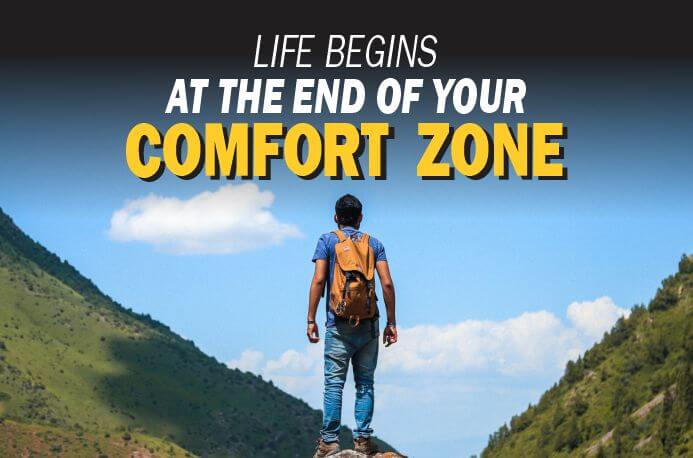Last updated on June 5th, 2025 at 04:28 pm
Life begins at the end of your comfort zone, that is why you need to master these tips to step out of your comfort zone and unlock endless possibilities.
At a time, everyone would have had enough of their boring comfort zones where lack, dissatisfaction, unfulfillment, and low self-esteem reign supreme.
In order to attain life mastery and truly experience and achieve great things, you must be willing to face challenges, take risks, and step outside of what feels safe and familiar.
This desire to step into the discomfort could be triggered by many factors including poverty, adventure, maturity, or any other factor that makes you wake from your slumber and take a step, even if it’s into the unknown.
In this article, we will discuss what a comfort zone is, the benefits of stepping out from it, and how to actually do so.
Table of Contents
- Comfort zone meaning
- Life Begins At The End Of Your Comfort Zone Meaning
- Examples of comfort zones
- How comfort zones can hold you back
- Benefits of leaving your comfort zone
- The obstacles that make stepping outside of your comfort zone difficult
- How to step out of your comfort zone
- Examples of people who stepped out of their comfort zones
- Final thoughts
- Frequently asked questions
Comfort zone meaning
The term “comfort zone” refers to a psychological state in which a person feels familiar, safe, and in control of their surroundings or circumstances.
It is the area where a person feels at ease and experiences a sense of security and familiarity, and where they can perform tasks and engage in behaviours without feeling anxiety or discomfort.
A comfort zone can be physical or mental, and it can vary in size and scope.
For example, someone might have a physical comfort zone that includes their home, neighborhood, and workplace, while their mental comfort zone might include familiar routines, beliefs, and relationships.
Stepping outside of one’s comfort zone can be challenging and uncomfortable, but it is often necessary for personal growth, learning, and development.
By pushing oneself beyond the boundaries of what feels comfortable, a person can experience new perspectives, skills, and opportunities that can help them to achieve their goals and reach their full potential.
Life Begins At The End Of Your Comfort Zone Meaning
“Life begins at the end of your comfort zone” is a powerful mantra that encourages you to break free from the confines of familiarity and embrace the unknown.
It signifies the idea that true growth and self-discovery lie beyond the boundaries of comfort.
By testing your limits, you improve mental mastery, you open yourself up to new experiences, challenges, and opportunities for personal development.
It is through these moments of discomfort and uncertainty that you learn, adapt, and ultimately thrive.
Embracing this philosophy can lead to a more fulfilling and extraordinary life, where you continuously push your limits and discover your true potential.
Examples of comfort zones
It’s important to note that comfort zones can vary from person to person, and can be both positive and negative.
While comfort zones provide a sense of security and stability, staying in them for too long can lead to stagnation and missed opportunities for growth and development.
Here are some examples of comfort zones:
- Social comfort zone: For some people, their social comfort zone might include only interacting with close friends and family, while for others it may involve engaging in social activities such as attending parties or networking events.
- Work comfort zone: An individual’s work comfort zone might be doing tasks that they are familiar and comfortable with, rather than taking on new or challenging tasks that require them to learn and grow. Physical comfort zone: This might include a specific environment or place where a person feels comfortable, such as their home or a favorite coffee shop.
- Mental comfort zone: This could include holding onto beliefs or perspectives that feel safe and familiar, rather than exploring new ideas or challenging one’s own assumptions.
- Relationship comfort zone: For some, this might involve maintaining relationships with people who are familiar and comfortable, rather than forming new connections that could be outside their comfort zone.
Related: Selfhood and its Importance in Personal Growth
How comfort zones can hold you back

Comfort zones can hold you back by limiting growth, creating a fear of failure, inhibiting innovation, and causing you to miss out on new opportunities.
Here are some of the ways you are stunted by your comfort zone:
- Limited growth: When you stay within your comfort zone, you are limiting your opportunities to grow and learn new things. We become complacent and can miss out on new experiences and personal development.
- Fear of failure: One of the main reasons you stay within your comfort zone is the fear of failure. You may be afraid to take risks and try new things because you fear you may fail. This fear can prevent you from taking on challenges and achieving your goals.
- Lack of innovation: Comfort zones can inhibit innovation and creativity. When you stay within your comfort zone, you tend to repeat the same tried and tested strategies and ideas. you may not challenge yourself to come up with new and innovative ideas.
- Missed opportunities: In your comfort zone, you miss out on new opportunities that present themselves. You may not be willing to take risks and try new things which could lead to new opportunities.
Benefits of leaving your comfort zone

When you summon the courage to leave your comfort zone, you will witness the following benefits:
- Personal and professional growth: Yes! Life begins at the end of your comfort zone because opportunities and growth abound in the unknown. You cannot improve personally or professionally when you continue to do the same things. Outside of your comfort zone, you challenge yourself to step into the unknown, and this helps you grow in ways you never thought possible.
- Improved confidence: Testing your limits and embracing the unknown can be scary, but once you are out, you’ll feel a sense of pride and accomplishment that boosts your confidence.
- New experiences and skills: When you stay in your comfort zone, you’re limited to experiences you’re familiar with and skills you already had, but by leaving it, you’ll have new opportunities to learn, try new things, and meet new people.
- Flexibility: Leaving your comfort zone challenges you to adapt to new situations, environments, and people, which improves your ability to be flexible and open-minded.
- Increased creativity: Trying something new can inspire creativity, and help you develop innovative solutions to problems.
- Better decision-making: By exposing yourself to new experiences, you’ll have a broader perspective, and make more informed decisions.
Also Read: Fake It Till You Make It: The Pros and Cons
- Overcoming fear: Outside your comfort zone, you push through fear, which can lead to reduced anxiety and fear in your everyday life.
- Learning from failures: Stepping into the unknown and trying new things can be daunting and sometimes lead to failure. However, failure can also be an essential teacher and provide valuable lessons for future success.
- A sense of accomplishment: Pushing your boundaries and taking a leap of faith can bring a great sense of accomplishment. When you try something new, something you’ve never done before, and you succeed, you feel a sense of pride and confidence that stays with you long after the experience is over.
The obstacles that make stepping outside of your comfort zone difficult

Believing only that your life starts at the end of your comfort zone won’t do the job, there are obstacles and resistances to tackle before you can break through:
- Fear of the unknown: Stepping outside of your comfort zone means taking on new challenges and experiences that you may be unsure of. This fear of the unknown can hold you back from trying something new.
- Self-doubt: A lack of confidence in your ability to handle new situations can also make stepping outside of your comfort zone difficult. You may doubt whether you have the skills, knowledge, or resources to succeed.
- Fear of failure: The fear of failure can prevent you from taking risks and trying new things. It can also make you reluctant to step out of your comfort zone, as you may believe that failure is inevitable.
- Overthinking: Overthinking can lead to analysis paralysis, where you become so focused on the potential outcomes and consequences of a situation that it becomes difficult to take action.
- Lack of motivation: If you don’t have a clear reason or purpose for stepping outside of your comfort zone, it can be hard to find the motivation to do so.
- Mindset: Oftentimes, we are stuck in a certain mindset or perspective that limits us from thinking outside the box or trying new things.
- Surrounding environment: Often, the people we surround ourselves with can limit our thinking in terms of trying new things, as we may be influenced by their opinions or beliefs.
- Fear of criticisms: Fear of criticism can be a significant barrier to stepping out of the comfort zone and experiencing growth and development. It is essential to recognize this fear and take steps to overcome it.
How to step out of your comfort zone

Life begins at the end of your comfort zone if you believe and take action. Remember, stepping into the unknown may feel uncomfortable in the short term, but the long-term benefits of building confidence, resilience, and personal growth are worth it.
Here are steps you can take to step out of your comfort zone into the unknown cum growth and development:
- Identify what makes you uncomfortable: Be honest with yourself and identify the things that make you scared, anxious, or nervous. It can be anything from socializing with strangers to public speaking.
- Set achievable goals: Start small by setting goals that push you just beyond your comfort zone. For example, trying a new restaurant or talking to someone you’ve never met before.
- Develop a plan: Identify the steps you need to take to achieve your goals. This may require researching, practicing, or seeking advice from others.
- Take action: Take action on your plan, even if it makes you feel uncomfortable. Always have it at the back of your mind that growth happens outside your comfort zone.
- Face your fears: Lean into your fears and the discomfort will make them less challenging. Challenge yourself to do things that scare you. With each step, your confidence will grow and your comfort zone will expand.
- Embrace uncertainty: Understand that stepping out of your comfort zone comes with uncertainty and potential failure, but embrace those opportunities to learn, grow, and develop resilience.
- Learn from setbacks: If you experience failure or setbacks, see them as an opportunity to learn and grow. Analyze what went wrong, embrace the lessons, and try again.
Examples of people who stepped out of their comfort zones
Here are people who believed and applied the quote “life begins at the end of your comfort zone.”
They defied the unknown and gave up their comfort zones to seek growth, adventure, and personal development:
- Malala Yousafzai: A Pakistani activist for female education who famously survived an assassination attempt by the Taliban.
- Elon Musk: The billionaire CEO of Tesla, SpaceX, and Neuralink who has revolutionized the tech industry.
- J.K. Rowling: Despite struggling with poverty and depression, Rowling wrote the Harry Potter series which has become a global phenomenon and cultural touchstone.
- Ruth Bader Ginsburg: The late Supreme Court Justice and feminist icon faced discrimination and obstacles throughout her career, but never gave up fighting for women’s rights and gender equality.
- Simone Biles: The Olympic gymnast overcame childhood trauma and injury to become one of the greatest gymnasts of all time, winning multiple gold medals and breaking numerous records.
- Beyoncé: The Grammy-winning singer, songwriter, and performer continues to push boundaries in her music and personal life, advocating for political and social causes.
- Greta Thunberg: The teenage environmental activist who inspired a global movement for climate action and was named Time Person of the Year in 2019.
Personal Stories of People who Stepped Out of their Comfort Zones
Here are personal stories of people who understood that life begins at the end of their comfort zones and took steps out of it:
My story: I discovered rather late that my absolute introversion won’t take me anywhere. Though being introverted has many benefits, it is always better to alternate as required. I stepped out of my closet and associated, and networked while retaining a part of my introversion and that was when my life took off for the better. I realized that people might be difficult, but remaining in your shell won’t help you either.
Zitere: Zitere was an introverted person just like me. He was always shy and reserved. One day, he decided to step out of her comfort zone and take up public speaking. Despite being terrified, he forced himself to speak in front of a large audience. To his surprise, he found that she enjoyed it and continued to push herself to do more public speaking events.
Paul: Paul was a graphic designer who always wanted to travel and explore new places. But he was too afraid to step out of his routine and take a break from work. One day, he decided to quit his job and travel the world, which was a big step out of his comfort zone. He traveled to different countries, met new people, and tried new things, which turned out to be an incredibly life-changing experience for him. He became a nomadic graphic designer.
Ndifreke: ND was a stay-at-home mother who always loved painting. However, she never thought about pursuing it as a career as it involved attending art classes and workshops. One day, she decided to take a chance and enrolled in an art school. Initially, it was challenging, but with determination and hard work, she became an accomplished painter and started exhibiting her artwork.
Ogu: Ogu was an introverted person like me who never enjoyed socializing and making new friends. One day, she joined a volunteer group and started working with children in her community. Though it was uncomfortable in the beginning, she started enjoying the process of building relationships with the kids and their families. This experience opened doors for new opportunities and friendships.
Final thoughts
Knowing that life begins at the end of your comfort zone will motivate you to step out of your familiar zone and leap.
Fear of the unknown, fear of failure, and uncertainty are the tools our comfort zone uses to hold us back, but when we overcome them, we take a flight for the first time and won’t stop flying.
Take charge today, step out of your comfort zone, and expand your horizon until everywhere becomes your comfort zone.
Frequently asked questions
What is the meaning of life begins at the end of your comfort zone?
The meaning of “life begins at the end of your comfort zone” is that we can only truly grow and experience new things when we step outside of our familiar and comfortable routines.
Who said life begins at the end of your comfort zone?
This statement is often attributed to Neale Donald Walsch, author of the bestselling book “Conversations with God.” However, the origins of this quote are uncertain, and it has been used by many different individuals as a motivational saying.
What exactly is the comfort zone?
The comfort zone is a psychological state in which an individual feels familiar, at ease, and in control of their environment and daily routine. It is a physical and mental space where one feels secure and unchallenged.
Why is the comfort zone important?
The comfort zone is important because it provides a sense of safety and familiarity but can also hinder personal growth and development. By stepping outside of our comfort zones, we can expand our horizons, learn new skills, and develop our potential.
How do people get stuck in their comfort zones?
People get stuck in their comfort zones because they fear losing control, uncertainty, and the unknown. This fear can prevent them from trying new things and taking risks.
What are the consequences of staying in our comfort zones?
Staying in our comfort zones can lead to stagnation, lack of personal growth, and missed opportunities for learning and development. It can also limit our potential and restrict our experiences and exposure to new possibilities.
What are some examples of stepping outside of my comfort zone?
Examples of stepping outside of your comfort zone include trying a new hobby, traveling to a new country, speaking in public, taking on a new job or career, learning a new language or skill, or facing a fear or phobia.
How can I overcome my fear of breaking out of my comfort zone?
Overcoming your fear of breaking out of your comfort zone takes practice, patience, and persistence. Start by taking small steps towards new experiences and try to reframe your feelings of fear as excitement or opportunity.
REFERENCES:
Pious Clements is the insightful voice behind "The Conducts of Life" blog, where he writes about life ethics, self-development, life mastery, and the dynamics of people and society.
With a profound understanding of human behaviuor and societal dynamics, Pious offers thought-provoking perspectives on ethical living and personal growth.
Through engaging narratives and astute observations, he inspires readers to navigate life's complexities with wisdom and integrity, encouraging a deeper understanding of the human experience and our place within society.

